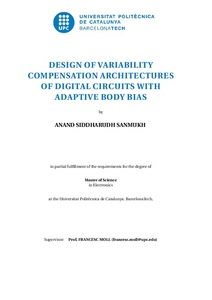Mostra el registre d'ítem simple
Design of variability compensation architectures of digital circuits with adaptive body bias
| dc.contributor | Moll Echeto, Francisco de Borja |
| dc.contributor.author | Sanmukh, Anand Siddharudh |
| dc.date.accessioned | 2017-05-29T12:15:40Z |
| dc.date.available | 2017-05-29T12:15:40Z |
| dc.date.issued | 2016-05-24 |
| dc.identifier.uri | http://hdl.handle.net/2117/104998 |
| dc.description.abstract | The most critical concern in circuit is to achieve high level of performance with very tight power constraint. As the high performance circuits moved beyond 45nm technology one of the major issues is the parameter variation i.e. deviation in process, temperature and voltage (PVT) values from nominal specifications. A key process parameter subject to variation is the transistor threshold voltage (Vth) which impacts two important parameters: frequency and leakage power. Although the degradation can be compensated by the worstcase scenario based over-design approach, it induces remarkable power and performance overhead which is undesirable in tightly constrained designs. Dynamic voltage scaling (DVS) is a more power efficient approach, however its coarse granularity implies difficulty in handling fine grained variations. These factors have contributed to the growing interest in power aware robust circuit design. We propose a variability compensation architecture with adaptive body bias, for low power applications using 28nm FDSOI technology. The basic approach is based on a dynamic prediction and prevention of possible circuit timing errors. In our proposal we are using a Canary logic technique that enables the typical-case design. The body bias generation is based on a DLL type method which uses an external reference generator and voltage controlled delay line (VCDL) to generate the forward body bias (FBB) control signals. The adaptive technique is used for dynamic detection and correction of path failures in digital designs due to PVT variations. Instead of tuning the supply voltage, the key idea of the design approach is to tune the body bias voltage bymonitoring the error rate during operation. The FBB increases operating speed with an overhead in leakage power. |
| dc.language.iso | eng |
| dc.publisher | Universitat Politècnica de Catalunya |
| dc.rights | S'autoritza la difusió de l'obra mitjançant la llicència Creative Commons o similar 'Reconeixement-NoComercial- SenseObraDerivada' |
| dc.rights.uri | http://creativecommons.org/licenses/by-nc-nd/3.0/es/ |
| dc.subject | Àrees temàtiques de la UPC::Enginyeria electrònica |
| dc.subject.lcsh | Digital integrated circuits |
| dc.subject.other | FBB- Forward body bias |
| dc.subject.other | PVT- process |
| dc.subject.other | voltage and temperature |
| dc.title | Design of variability compensation architectures of digital circuits with adaptive body bias |
| dc.type | Master thesis |
| dc.subject.lemac | Circuits integrats digitals |
| dc.identifier.slug | ETSETB-230.113177 |
| dc.rights.access | Open Access |
| dc.date.updated | 2016-06-10T10:29:47Z |
| dc.audience.educationlevel | Estudis de primer/segon cicle |
| dc.audience.mediator | Escola Tècnica Superior d'Enginyeria de Telecomunicació de Barcelona |


